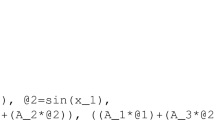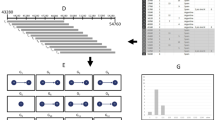Abstract
In this paper we present some new results concerning the least square family of values for TU games. We first examine the stability of these values from a dynamic point of view and propose a reinteropretation of them from the standpoint of the propernsity to disrupt approach. In the second part the family of individually rational least square (IRLS) values is introduced and an alternative kernel-like formulation of them is provided. Finally we describe a natural and simple algorithm for calculating any IRLS value of a game.
Similar content being viewed by others
References
Banzhaf, J. F. (1965). Weighted Voting doesn't work: A Mathematical Analysis.Rutgers Law Review 19, 317–343.
Charnes, A., Rousseau, J. and Seiford, L. (1978). Complements, Mollifiers and the Propensity to Disrupt”.International Journal of Game Theory 7, 37–50.
Davis, J. and Maschler, M. (1965). The kernel of a cooperative game.Naval Research Logistics Quarterly 12, 223–259.
Gately, D. (1974). Sharing the Gains from Regional Cooperation: a Game Theoretic Application to Planning Investment in Electric Power.International Economic Review 15, 195–208.
Grotte, J. H. (1976). Dynamics of Cooperative Games.International Journal of Game Theory 5, 27–64.
Littlechid, S. C. and Vaidya, K. G. (1976). The Propensity to Disrupt and the Disruption Nucleolus of a Characteristic Function Game.International Journal of Game Theory 5, 151–161.
Maschler, M., Peleg, B. S. and Shapley, L. S. (1979). Geometric Properties of the Kernel, Nucleolus and related Solutions Concepts.Mathematics of Operations Research 4, 303–338.
Ruiz, L. M. (1994)El Enfoque Mìnimo Cuadrático en los Juegos con Utilidad Transferible, (in Spanish), Thesis. Departamento de Economía Aplicada I, Basque Country University, Bilbao.
Ruiz, L. M., Valenciano, F. and Zarzuelo, J. M. (1996). The Least Square Prenucleolus and the Least Square Nucleolus. Two Values for TU Games Based on the Excess Vector.International Journal of Game Theory 25, 113–134.
Ruiz, L. M., Valenciano, F. and Zarzuelo, J. M. (1998). The Family of Least Square Values for Tranferable Utility Games.Games and Economic Behavior 24, N1, 109–130.
Shapley, L. S. (1953). A Value forn-Person Games.Annals of Mathematics Studies 28, 307–317.
Spinetto, R. D. (1971). Solution concepts of n-person cooporative games as points in the game space. Technical report No 138, Department of Operations Research, College of Engineering, Cornell University, Ithaca, NY.
Author information
Authors and Affiliations
Additional information
We gratefully acknowledge financial support from the Basque Government (Project PI95/101) and from the D.G.E.S. of the Ministerio de Educatión y Cultura (Project PB96-0247).




